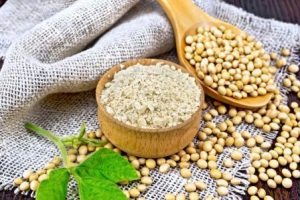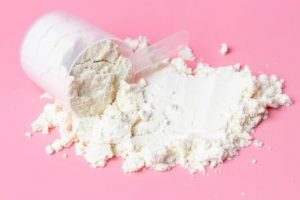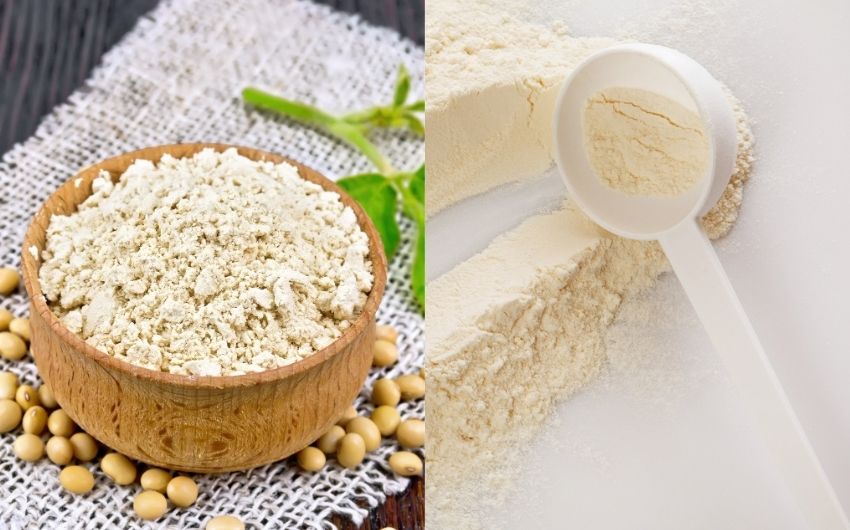Which protein is the best for you? Whey or soy protein?
Honestly, the choice is really tough, especially when both the available options are way too excellent with their nutritional values.
Many health experts suggest having a combination of both these proteins to get benefits from each one of them. However, the challenge comes when you have to make a choice. This is where it is vital to understand the difference between both types of protein.
Let us have an in-depth comparison between both these protein types – whey protein vs soy protein to make a suitable choice.
What are whey and soy proteins?
Soy protein:

For creating soy protein, manufacturers grind soybean (a legume type, naturally rich in protein and low in fat) into a kind of meal. The generated soybean meal is processed to make soy protein isolate containing around 90-95% protein.
The soy protein isolate is enriched with natural protein with low carbohydrate value. Many manufacturers mix some additional nutrients to the soy isolate to enhance its taste, nutritional value, and overall texture.
Whey protein:

Talking about whey protein, it is created with the help of cow milk. Naturally, cow milk contains around 3.5% protein and 4% fat, which is then pasteurized to remove bacteria.
After removing bacteria, special enzymes are mixed in the milk for separating casein from whey. The isolated whey is then further processed for removing the excess water, fats, and carbohydrate to finally generate a whey powder rich in protein.
Comparing whey protein and soy protein:
It is true, both whey and soy protein are best known for muscle building, but there are many differences between them. As you hunt to choose a suitable protein powder, it is crucial to understand the fundamental differences.
Here are some of the significant differences that will help you make the right choice between whey and soy protein:
Biological values:
The biological value of any protein indicates how well the body utilizes the protein and how fast it is absorbed. The faster the protein is absorbed, the faster it shows its benefits for the body.
Whey protein has its biological value between 104-110, and soy protein has its biological value in the mid-70s. Thus, on comparing both the values, whey protein emerges as a clear winner, meaning that whey is absorbed faster by the body with quick utilization for various needs.
Testosterone level impact:
Testosterone is an important male hormone whose low level can cause reduced bone mass.
According to various tests and research, it was found that soy protein results in low testosterone levels. In comparison to this, whey protein is considered a safe option. Whey does not negatively impact testosterone levels but also balances the cortisol response in the body after a heavy workout session.
Thus, whey protein ensures to maintain the desired level of testosterone in males for healthy functioning of the body.
Glutamine levels:
Glutamine is one essential amino acid needed to repair body muscles with enhanced muscle growth. Therefore, it is suggested to attentively consider the glutamine level in your chosen protein powder to get the best results.
The glutamine levels in soy protein are seen to be higher than whey protein. Also, the concentration of glutamine and arginine amino acids is higher in soy protein, making it a better option for selection.
Net protein utilization:
Talking about this, NPU measures the protein quality used for nutritional needs. It can be understood as the ratio between the amino acid converted into proteins to the amino acids supplied in the body.
Measuring it on a 100-scale, the 100 NPU value means that all the amino acids are converted into protein for utilization by the body.
Comparing both the available protein options, whey protein has a 92-NPU value while soy protein has its NPU value ranging in low-60s. Thus, it can be seen that in terms of NPU value, whey protein stands as a winner over soy protein.
Shelf life:
Proteins are mostly processed before being delivered to the customers and are expected to have a long shelf life. Whey and soy protein both have a shelf life of 1-year and more.
When stored properly, you can use both the proteins without any problems. Thus, you can buy both the protein types in bulk quantities and enjoy their benefits without worrying about them being spoiled or go bad in quality.
Texture and taste:
It is the personal choice and preference of the users when it comes to the texture and taste of the chosen protein. Also, the used additives and stabilizers affect the taste of different brands. You can also select an unflavoured version of the protein and add your favorite flavor to it.
Whey protein is a little creamy and smooth in its texture with a mild nutty taste. On the other hand, drinks made using soy protein are grainier with strong nutty flavors.
Amino acids type:
Amino acids are a pretty important part of protein powders. They tend to enhance the quality and nutritional value of the protein. A protein powder with a higher number of amino acids is considered better than the rest.
Both whey and soy protein contain all the 9 effective amino acids, but they vary in the compositions of the other available amino acids.
Talking about whey protein, other than those 9 amino acids, it contains high levels of leucine, isoleucine, lysine, and methionine. Soy protein, on the other hand, is rich in arginine, tryptophan, and phenylalanine.
Thus, based on different types of amino acids, you can choose the protein that fulfills your needs.
Dietary restrictions:
Whey protein can be a little troubling for lactose-intolerant people. It is believed that even the most processed whey protein forms (whey isolates and whey hydro-isolates) can cause trouble to people who are lactose sensitive.
As a result, for such people, soy protein makes an excellent option to pick. You should test the protein before consuming it regularly. You can also take advice from your health experts to be sure about your choice.
The other dietary restriction that can be an issue for some people is the source of protein extraction. Whey protein is extracted from an animal source which is a big no-no for vegans and vegetarian users. Therefore, soy protein tends to be a great choice for such users to meet the daily protein and amino acids requirements.
Nutritional assets:
Undoubtedly, protein is a vital element in body-building, but it is not the only requirement. For maintaining a balance, bodybuilders need other nutrients as well. For example, the B2 vitamin helps in protein breakdown, and zinc produces testosterone for muscle-building.
Different protein powders come enriched with other nutrients, which play a vital role in maintaining the overall health of the users. Therefore, it is recommended to have a closer look at the various offered nutritional values available in the protein powder before making up your mind.
The Final Call:
Soy protein and whey protein are dietary supplements helping to fulfill the body’s daily protein requirements. Indeed, both of them have their benefits; research indicates that whey protein is a little ahead of soy protein.
Whey protein stands as a potential winner in its comparison with soy protein based on its biological value, amino acid profile, faster absorption rate, and net utilization of protein. Thus, if you are still in doubt about choosing between whey protein and soy protein, we would like to recommend whey protein.
However, you should make a choice, between the two, according to your body needs. Get consulted by a health expert to get the best advice. For any other information, drop us your thoughts and concerns in the comment section.


